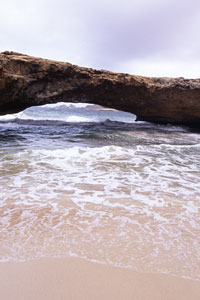Nestled in warm Caribbean waters off the north coast of Venezuela, Aruba can sometimes feel like a smaller state of the USA. It remains, however, a Dutch protectorate with its own distinctive local flavour beyond the package resorts. With a warm, dry climate the sheltered coastline of the south-west is the ultimate hedonistic paradise; exposed to the full might of the ocean’s wrath, the northern coast is a bruised, untamed hinterland that makes a great escape if you fancy a day wandering in the wilderness.
There are plenty of other diversions to get your pulse racing, too; a diverse selection of watersport facilities that include everything from scuba-diving to ski-jumping, an array of bars, clubs and 24 hour casinos, not to mention a lively salsa scene and a host of colourful carnivals. Most prefer simply to relax on endless white beaches, sipping cocktails and soaking up the tropical sun.
The island was originally settled as an aloe plantation; the plant thrived in the semi-arid climate and has been prized for its cosmetic and medicinal benefits since the times of the Ancient Greeks. Yet increasing development has seen the significance of this industry diminish and today the economy is largely tourist-based, while limited oil reserves and a growing international banking presence have also begun to play a major part.
Today, government incentives offer subsidies for overseas investment, particularly in capital-intensive projects, free zone activities, telecommunication, finance sector and tourism related services. The workforce is becoming increasingly internationalised and work practices have come to a reflect a mixture of European, North American and local Caribbean ideas.
Getting there
Reina Beatrix International Airport is the island’s main international airport.
Getting around
Buses serve Oranjestad but don’t go to the outlying parts of the island. For exploring further afield, taxis are available, or car rental may be more cost effective if staying for a few days. Distances are small and it is possible to walk from one end of the island to the other within a day.
Local information
Language(s): Dutch, Papiamento
Time: UTC-4
Climate: Tropical. Hot with moderate rainfall all year round. Temperature: Max 33°C (September), Min 23°C (March). Rainfall: Max 100mm (November), Min 10mm (April).
Currency: Aruban florin (AWG)
Business etiquette: Dress conservatively for initial meeting; a lightweight suit is often sufficient. Etiquette tends to similar to the USA, though communication style is less direct. The Aruban people value peace and harmony and direct confrontation or criticism should be avoided.
Tipping: 15 percent service charge is usually included in the bill.
Duty free: 200 cigarettes or 50 cigars; 1l of spirits or 2.25l of wine or 3l of beer; Gifts to a value of Afl100.
Safety: The crime rate is generally low but the island is used to smuggle drugs from South to North America; be vigilant and do not leave bags unattended.
Laws: Carry identification at all times. Bags are screened on entry and exit due to drug trafficking problems.
Healthcare: Vaccinations required for hepatitis A and tetanus. Medical facilities are excellent and many hotels have on call doctors. Health insurance is advisable but not essential.
Socket type: Type A, Type F





